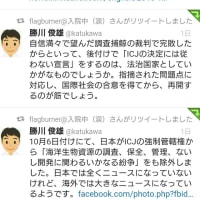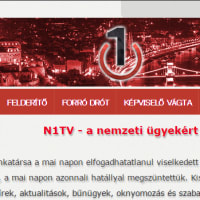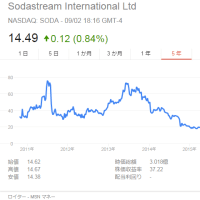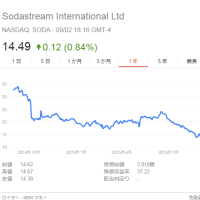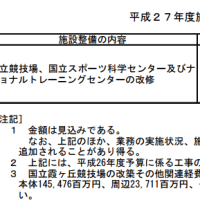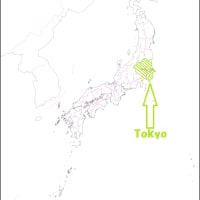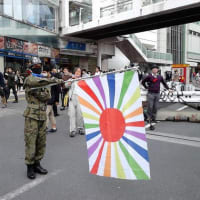一昨日のことになるが、オーストラリア政府が南極海「調査捕鯨」を監視するために飛行機を送り出したらしい。
・捕鯨監視で航空機派遣=豪政府、6年ぶり再開(2014年1月14日 時事ドットコム)
色んな意味で Sea Shepherd やオーストラリアの野党から反発必至なこの話。
以下、2014年1月14日分 時事ドットコム『捕鯨監視で~』を全文(略
---- 以下引用 ----
【シドニー時事】
オーストラリアのハント環境相は14日、南極海での日本の調査捕鯨と反捕鯨団体の行動を上空から監視するため、税関・国境警備局の航空機を12日に派遣したと明らかにした。
派遣は昨年9月に発足したアボット政権で初めて。
反捕鯨を訴える環境団体や世論の要請を受け、政府による捕鯨監視行動を6年ぶりに復活させた。
環境相は「『調査捕鯨』を含むすべての商業捕鯨に強く反対する」と改めて表明。
日本政府に対し、豪領海内や排他的経済水域内で捕鯨を行わないよう通知したという。
(2014/01/14-09:57)
---- 引用以上 ----
当初、オーストラリア政府は「調査捕鯨」団の監視船を派遣するのを公約として掲げてたのに、実際は飛行機を派遣したという経緯がある。
それを踏まえると、Sea Shepherd が反発したのは当然の流れだった。
・Australia completes first flyover mission monitoring Japanese whaling fleet(2014年1月13日 abc.net.au)
ちうわけで、2014年1月13日分 abc.net.au『Australia completes~』から、Bob Barker 号の船長ことピーター・ハマーステット(Peter Hammarstedt)氏のコメント部分を(略
---- 以下引用 ----
(中略)
Captain Peter Hammarstedt says the plane was easily identified.
"They certainly flew low enough to make sure that they would be seen and recognised, however they did not make any kind of radio contact with the Bob Barker," he said.
The anti-whaling activists say a plane monitoring the Japanese fleet is unlikely to stop illegal activity and only a Customs ship will be able to intervene.
"I don't foresee that plane capturing anything different than the type of footage Sea Shepherd's already delivered to the world media one week ago of four dead minke whales in the Southern Ocean whale sanctuary," he said.
(以下略)
---- 引用以上 ----
オーストラリア政府としては「調査捕鯨」団を「監視した」と宣伝できればそれでよし、という姿勢なのかもしれんが・・・。
ドナルド・ロズウェル(Donald R. ROTHWELL)教授曰く、この判断については、1959年の南極条約(1959 Antarctic Treaty)の問題点が絡んでるっぺぇ。
・A lot more is at stake than just whaling(2014年1月7日 abc.net.au)
以下、2014年1月7日分 abc.net.au 『A lot more is~』から後半部分を(略
---- 以下引用 ----
(中略)
It is not widely appreciated that notwithstanding Australia's longstanding claim to the Australian Antarctic Territory, that claim is not widely recognised.
In fact only France, New Zealand, Norway and the UK formally recognise the Australian claim, and those countries also have territorial claims in Antarctica.
Not only is Australia's Antarctic claim not widely recognised, Australia is also compromised from actively asserting its sovereignty in Antarctica under the terms of the 1959 Antarctic Treaty.
The Treaty was negotiated at the height of the Cold War at a time when there was grave concern that Antarctica could become the scene of territorial dispute between America and Russia.
Article IV of the Treaty attempted to settle these disputes by putting to one side all territorial issues, and by and large it has been very successful.
One element of this settlement was that Australia also agreed to limitations on the exercise of Australian law against foreign nationals.
As a result, any attempt by Australia to enforce its laws against foreigners in the Australian Antarctic Territory including the adjacent waters of the Australian Whale Sanctuary would be seen as a violation of the Treaty.
This reality was recognised by former Coalition Attorney-General Philip Ruddock in submissions made to the Federal Court in 2004.
Australia's Antarctic legal reality is that active enforcement of Australian law that prohibits whaling in the Australian Whale Sanctuary against the Japanese whalers could unleash a diplomatic and legal maelstrom with very serious consequences for Australia's Antarctic claim and for the Antarctic Treaty.
This is something which any Australian government would wish to avoid.
As a result, Greg Hunt's decision to undertake aerial monitoring of the Japanese whalers is a more prudent course of action.
It gives to the Australian government some capacity to exercise surveillance of whaling while remaining at arms' length from any Southern Ocean confrontations that may develop between Sea Shepherd and the whalers.
The Abbott Government is also right to be cautious at this time about not seeking to inflame tensions with Japan over whaling.
(以下略)
---- 引用以上 ----
ROTHWELL教授のコメントは、国際法や条約の解釈がイカに難しいかってのを示してると言うべきか・・・。
これだけ解釈の幅が広いと、時代によってその解釈が変わってしまって頭が混乱必至と見た(汗)。
もっとも、ピーター・ウィルソン上院議員(Peter Stuart WHISH-WILSON)に言わせると、例の判断はオーストラリアの国内政治の影響が大きいとか。
・The real reason behind the whaling backflip(2014年1月10日 abc.net.au)
参考までに、2014年1月10日分 abc.net.au『The real reason~』から終盤部分を(略
---- 以下引用 ----
[オーストラリアの監視船は、現在シンガポールなどに派遣されているらしい]
(中略)
For Australia, our ability to maintain our influence over future resource use in the Southern Ocean and Antarctica such as mining or fishing depends on us maintaining a strong presence in the region.
Whether this means keeping a close watch on Japanese whalers or stopping illegal fishing, it will mean the regular presence of a vessel like the ACV Ocean Protector.
But unlike Professor Rothwell's contention that it was international legal worries that caused Minister Hunt to break his promise, my contention is that it was primarily domestic internal politics within the government that won the day.
Scott Morrison held more sway in cabinet than Greg Hunt.
The Government has chosen to look north to a faux threat, rather than look south to a real one.
Asylum seekers do not impinge on our sovereignty.
But the entire world's view of whether parts of the Southern Ocean are ours depends on maintaining our presence there, not abandoning it.
This decision will come at a cost and not just for the whales.
---- 引用以上 ----
オーストラリアでは「調査捕鯨」に対抗する政策が比較的優先順位が低いってのを示した一件、というオチ(謎)
・捕鯨監視で航空機派遣=豪政府、6年ぶり再開(2014年1月14日 時事ドットコム)
色んな意味で Sea Shepherd やオーストラリアの野党から反発必至なこの話。
以下、2014年1月14日分 時事ドットコム『捕鯨監視で~』を全文(略
---- 以下引用 ----
【シドニー時事】
オーストラリアのハント環境相は14日、南極海での日本の調査捕鯨と反捕鯨団体の行動を上空から監視するため、税関・国境警備局の航空機を12日に派遣したと明らかにした。
派遣は昨年9月に発足したアボット政権で初めて。
反捕鯨を訴える環境団体や世論の要請を受け、政府による捕鯨監視行動を6年ぶりに復活させた。
環境相は「『調査捕鯨』を含むすべての商業捕鯨に強く反対する」と改めて表明。
日本政府に対し、豪領海内や排他的経済水域内で捕鯨を行わないよう通知したという。
(2014/01/14-09:57)
---- 引用以上 ----
当初、オーストラリア政府は「調査捕鯨」団の監視船を派遣するのを公約として掲げてたのに、実際は飛行機を派遣したという経緯がある。
それを踏まえると、Sea Shepherd が反発したのは当然の流れだった。
・Australia completes first flyover mission monitoring Japanese whaling fleet(2014年1月13日 abc.net.au)
ちうわけで、2014年1月13日分 abc.net.au『Australia completes~』から、Bob Barker 号の船長ことピーター・ハマーステット(Peter Hammarstedt)氏のコメント部分を(略
---- 以下引用 ----
(中略)
Captain Peter Hammarstedt says the plane was easily identified.
"They certainly flew low enough to make sure that they would be seen and recognised, however they did not make any kind of radio contact with the Bob Barker," he said.
The anti-whaling activists say a plane monitoring the Japanese fleet is unlikely to stop illegal activity and only a Customs ship will be able to intervene.
"I don't foresee that plane capturing anything different than the type of footage Sea Shepherd's already delivered to the world media one week ago of four dead minke whales in the Southern Ocean whale sanctuary," he said.
(以下略)
---- 引用以上 ----
オーストラリア政府としては「調査捕鯨」団を「監視した」と宣伝できればそれでよし、という姿勢なのかもしれんが・・・。
ドナルド・ロズウェル(Donald R. ROTHWELL)教授曰く、この判断については、1959年の南極条約(1959 Antarctic Treaty)の問題点が絡んでるっぺぇ。
・A lot more is at stake than just whaling(2014年1月7日 abc.net.au)
以下、2014年1月7日分 abc.net.au 『A lot more is~』から後半部分を(略
---- 以下引用 ----
(中略)
It is not widely appreciated that notwithstanding Australia's longstanding claim to the Australian Antarctic Territory, that claim is not widely recognised.
In fact only France, New Zealand, Norway and the UK formally recognise the Australian claim, and those countries also have territorial claims in Antarctica.
Not only is Australia's Antarctic claim not widely recognised, Australia is also compromised from actively asserting its sovereignty in Antarctica under the terms of the 1959 Antarctic Treaty.
The Treaty was negotiated at the height of the Cold War at a time when there was grave concern that Antarctica could become the scene of territorial dispute between America and Russia.
Article IV of the Treaty attempted to settle these disputes by putting to one side all territorial issues, and by and large it has been very successful.
One element of this settlement was that Australia also agreed to limitations on the exercise of Australian law against foreign nationals.
As a result, any attempt by Australia to enforce its laws against foreigners in the Australian Antarctic Territory including the adjacent waters of the Australian Whale Sanctuary would be seen as a violation of the Treaty.
This reality was recognised by former Coalition Attorney-General Philip Ruddock in submissions made to the Federal Court in 2004.
Australia's Antarctic legal reality is that active enforcement of Australian law that prohibits whaling in the Australian Whale Sanctuary against the Japanese whalers could unleash a diplomatic and legal maelstrom with very serious consequences for Australia's Antarctic claim and for the Antarctic Treaty.
This is something which any Australian government would wish to avoid.
As a result, Greg Hunt's decision to undertake aerial monitoring of the Japanese whalers is a more prudent course of action.
It gives to the Australian government some capacity to exercise surveillance of whaling while remaining at arms' length from any Southern Ocean confrontations that may develop between Sea Shepherd and the whalers.
The Abbott Government is also right to be cautious at this time about not seeking to inflame tensions with Japan over whaling.
(以下略)
---- 引用以上 ----
ROTHWELL教授のコメントは、国際法や条約の解釈がイカに難しいかってのを示してると言うべきか・・・。
これだけ解釈の幅が広いと、時代によってその解釈が変わってしまって頭が混乱必至と見た(汗)。
もっとも、ピーター・ウィルソン上院議員(Peter Stuart WHISH-WILSON)に言わせると、例の判断はオーストラリアの国内政治の影響が大きいとか。
・The real reason behind the whaling backflip(2014年1月10日 abc.net.au)
参考までに、2014年1月10日分 abc.net.au『The real reason~』から終盤部分を(略
---- 以下引用 ----
[オーストラリアの監視船は、現在シンガポールなどに派遣されているらしい]
(中略)
For Australia, our ability to maintain our influence over future resource use in the Southern Ocean and Antarctica such as mining or fishing depends on us maintaining a strong presence in the region.
Whether this means keeping a close watch on Japanese whalers or stopping illegal fishing, it will mean the regular presence of a vessel like the ACV Ocean Protector.
But unlike Professor Rothwell's contention that it was international legal worries that caused Minister Hunt to break his promise, my contention is that it was primarily domestic internal politics within the government that won the day.
Scott Morrison held more sway in cabinet than Greg Hunt.
The Government has chosen to look north to a faux threat, rather than look south to a real one.
Asylum seekers do not impinge on our sovereignty.
But the entire world's view of whether parts of the Southern Ocean are ours depends on maintaining our presence there, not abandoning it.
This decision will come at a cost and not just for the whales.
---- 引用以上 ----
オーストラリアでは「調査捕鯨」に対抗する政策が比較的優先順位が低いってのを示した一件、というオチ(謎)











